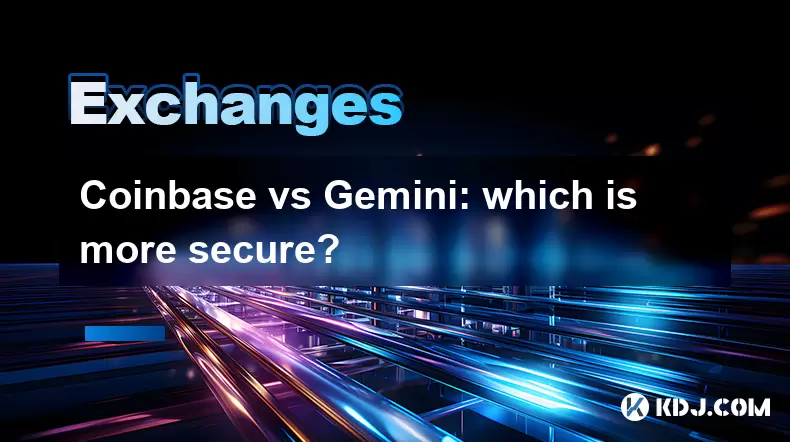-
 bitcoin
bitcoin $87959.907984 USD
1.34% -
 ethereum
ethereum $2920.497338 USD
3.04% -
 tether
tether $0.999775 USD
0.00% -
 xrp
xrp $2.237324 USD
8.12% -
 bnb
bnb $860.243768 USD
0.90% -
 solana
solana $138.089498 USD
5.43% -
 usd-coin
usd-coin $0.999807 USD
0.01% -
 tron
tron $0.272801 USD
-1.53% -
 dogecoin
dogecoin $0.150904 USD
2.96% -
 cardano
cardano $0.421635 USD
1.97% -
 hyperliquid
hyperliquid $32.152445 USD
2.23% -
 bitcoin-cash
bitcoin-cash $533.301069 USD
-1.94% -
 chainlink
chainlink $12.953417 USD
2.68% -
 unus-sed-leo
unus-sed-leo $9.535951 USD
0.73% -
 zcash
zcash $521.483386 USD
-2.87%
Coinbase vs Gemini: which is more secure?
Coinbase and Gemini both offer strong security features like 2FA, encryption, and cold storage, but Gemini stands out with its trust charter and monthly proof-of-reserve reports.
Jul 07, 2025 at 04:08 pm

Security Features Overview
When comparing Coinbase and Gemini, security remains a top priority for users. Both platforms implement robust measures to protect user assets and personal information. Coinbase utilizes two-factor authentication (2FA), biometric login options, and advanced encryption techniques. It also stores the majority of its digital assets in offline cold storage, reducing the risk of hacking incidents. Additionally, Coinbase maintains an insurance policy that covers losses from potential breaches.
On the other hand, Gemini offers similar security protocols, including 2FA and encrypted data transmission. Gemini's cold storage system is highly regarded, with funds stored in geographically distributed vaults. The platform also undergoes regular third-party audits to ensure compliance with industry standards. Gemini Trust Company, the parent company of Gemini, is regulated by the New York State Department of Financial Services, which adds another layer of oversight.
Regulatory Compliance and Transparency
Regulatory compliance plays a crucial role in assessing the security of cryptocurrency exchanges. Coinbase operates under various financial regulations globally and has obtained licenses in multiple jurisdictions. It complies with Anti-Money Laundering (AML) and Know Your Customer (KYC) policies, ensuring user identity verification before transactions can occur. This level of regulatory adherence helps mitigate risks associated with fraudulent activities.
Gemini distinguishes itself by being one of the few crypto exchanges chartered as a trust company under New York banking law. This designation subjects Gemini to stricter capital requirements and routine examinations by regulators. Furthermore, Gemini publishes monthly proof-of-reserves reports, allowing users to verify their account balances independently. This transparency fosters trust among investors who seek assurance about their holdings' safety.
User Account Protection Measures
Protecting individual accounts from unauthorized access is essential for both platforms. Coinbase allows users to enable features such as device management, which alerts them when a new device logs into their account. It also provides optional SMS or authenticator app-based 2FA methods. Users can set up withdrawal whitelists to restrict fund transfers only to pre-approved addresses.
Similarly, Gemini offers comprehensive account protection tools. In addition to 2FA, Gemini supports hardware wallet integration for added security layers. The platform employs IP address monitoring and suspicious activity detection systems. If any unusual behavior is detected, Gemini may temporarily lock accounts until users confirm their identities through additional verification steps.
Incident Response and Historical Performance
Examining past performance regarding security breaches provides insight into each exchange's reliability. Coinbase has maintained a relatively clean record since its inception, having avoided major hacks due to its strong security infrastructure. However, like many online services, it has faced phishing attempts and account takeover incidents. Coinbase actively educates users on best practices for securing their accounts and responds swiftly to reported threats.
In contrast, Gemini has not experienced any significant security breaches either. Its proactive approach includes real-time monitoring of network traffic for anomalies and immediate response protocols upon detecting vulnerabilities. Despite facing scrutiny over customer service delays during high-volume periods, Gemini continues to uphold its reputation for safeguarding user assets effectively.
Insurance Coverage and Risk Mitigation Strategies
Insurance policies serve as critical components in evaluating exchange security. Coinbase carries a comprehensive insurance policy that covers digital asset losses resulting from cybersecurity breaches. This coverage extends beyond just theft scenarios; it includes technical failures or operational errors leading to loss of funds. Coinbase regularly updates its insurance framework to adapt to evolving risks within the cryptocurrency ecosystem.
Gemini also offers protection against theft and cyberattacks through its custodial insurance program. Unlike some exchanges that rely solely on traditional insurers, Gemini partners with specialized firms familiar with blockchain-related risks. These partnerships ensure tailored coverage that aligns closely with the unique challenges posed by digital currencies. Moreover, Gemini’s reserve management strategy ensures liquidity availability even during unforeseen events.
Frequently Asked Questions
What happens if my email associated with Coinbase gets compromised?
If your email linked to your Coinbase account becomes compromised, immediate action is necessary. Begin by changing your email password using a strong combination of letters, numbers, and symbols. Next, log into your Coinbase account and update your recovery email settings. Enable enhanced security features like device confirmation and review recent sign-in locations for irregularities.
How does Gemini handle lost private keys?
Gemini emphasizes self-custody solutions where users retain control over their private keys. If you lose access to your private key for a non-custodial wallet provided by Gemini, there is no way to recover it directly through the platform. You must rely on backup phrases generated during wallet creation. Always store these backups securely offline or in encrypted formats to prevent permanent loss.
Can I transfer funds between Coinbase and Gemini easily?
Transferring funds between Coinbase and Gemini involves standard cryptocurrency transactions. Start by initiating a withdrawal request on one platform while noting the recipient address details carefully. Then proceed to deposit those funds into the corresponding wallet on the second platform. Be mindful of network fees and processing times, which vary depending on blockchain congestion levels. Double-check receiving addresses to avoid irreversible mistakes.
Are there differences in how Coinbase and Gemini handle government requests for user data?
Both Coinbase and Gemini comply with legal mandates concerning user data disclosure. They follow strict procedures outlined by applicable laws such as GDPR or U.S. Patriot Act provisions. Upon receiving official subpoenas or court orders, both exchanges review requests thoroughly before releasing information. However, specific handling nuances might exist based on regional legal frameworks governing each entity's operations.
Disclaimer:info@kdj.com
The information provided is not trading advice. kdj.com does not assume any responsibility for any investments made based on the information provided in this article. Cryptocurrencies are highly volatile and it is highly recommended that you invest with caution after thorough research!
If you believe that the content used on this website infringes your copyright, please contact us immediately (info@kdj.com) and we will delete it promptly.
- BERA, BTC, Jasmy: Altcoins Sparkle as Bitcoin Navigates Critical Crossroads
- 2026-02-12 15:45:01
- Pi Network Gears Up for Mainnet Node Upgrade with February 2026 Deadline, Emphasizing Stability and Decentralization
- 2026-02-12 15:35:01
- The Art Market Gets Smart: AI-Driven Growth and Efficiency Reshape a Global Landscape
- 2026-02-12 16:20:02
- Cardano's Big Apple Move: LayerZero Integration Ignites Cross-Chain Future and Institutional Ambition
- 2026-02-12 16:15:01
- APEMARS Ignites Meme Coin Frenzy with Explosive Presale Amid Market Volatility
- 2026-02-12 16:15:01
- Ethereum Navigates Volatility: A Liquidity Trap or Mega Cycle Prelude?
- 2026-02-12 16:00:01
Related knowledge

How to use Bybit VIP program to reduce trading fees?
Feb 11,2026 at 07:19am
Understanding Bybit VIP Program Structure1. The Bybit VIP program categorizes users into tiers based on their 30-day average net asset value and tradi...

How to buy JasmyCoin (JASMY) on Bybit?
Feb 09,2026 at 03:40am
Creating a Bybit Account1. Navigate to the official Bybit website and click the 'Sign Up' button located in the top-right corner. 2. Enter a valid ema...

How to contact Bybit customer support for urgent help?
Feb 05,2026 at 11:40pm
Accessing Bybit Support via Live Chat1. Log in to your Bybit account using the official website or mobile application. 2. Navigate to the Help Center ...

How to buy Injective (INJ) on Bybit in 2026?
Feb 09,2026 at 05:39pm
Account Registration and Verification Process1. Navigate to the official Bybit website and click the “Sign Up” button located in the top-right corner....

How to use Bybit Dual Asset investment for high yield?
Feb 06,2026 at 12:20am
Understanding Bybit Dual Asset Investment Mechanics1. Dual Asset Investment is a structured product offered by Bybit that combines a stablecoin deposi...

How to buy Celestia (TIA) on Bybit exchange?
Feb 10,2026 at 09:39pm
Creating a Bybit Account1. Visit the official Bybit website and click the “Sign Up” button located at the top right corner of the homepage. Enter a va...

How to use Bybit VIP program to reduce trading fees?
Feb 11,2026 at 07:19am
Understanding Bybit VIP Program Structure1. The Bybit VIP program categorizes users into tiers based on their 30-day average net asset value and tradi...

How to buy JasmyCoin (JASMY) on Bybit?
Feb 09,2026 at 03:40am
Creating a Bybit Account1. Navigate to the official Bybit website and click the 'Sign Up' button located in the top-right corner. 2. Enter a valid ema...

How to contact Bybit customer support for urgent help?
Feb 05,2026 at 11:40pm
Accessing Bybit Support via Live Chat1. Log in to your Bybit account using the official website or mobile application. 2. Navigate to the Help Center ...

How to buy Injective (INJ) on Bybit in 2026?
Feb 09,2026 at 05:39pm
Account Registration and Verification Process1. Navigate to the official Bybit website and click the “Sign Up” button located in the top-right corner....

How to use Bybit Dual Asset investment for high yield?
Feb 06,2026 at 12:20am
Understanding Bybit Dual Asset Investment Mechanics1. Dual Asset Investment is a structured product offered by Bybit that combines a stablecoin deposi...

How to buy Celestia (TIA) on Bybit exchange?
Feb 10,2026 at 09:39pm
Creating a Bybit Account1. Visit the official Bybit website and click the “Sign Up” button located at the top right corner of the homepage. Enter a va...
See all articles










































































